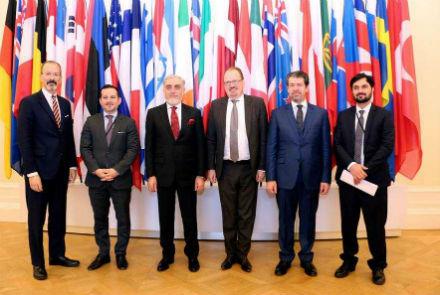CEO Abdullah Abdullah on Monday said it was vital to boost private sector development and economic policies in the country as this was the main engine of economic growth for Afghanistan.
Addressing delegates at the Organization for Economic Co-operation and Development (OECD) and the European Union – OECD Eurasia Week 2018 – conference in Paris, he addressed a session on 'Afghanistan Peer Review: Boosting Private Sector Development & Entrepreneurship Policies.'
The CEO said Afghanistan’s National Peace and Development Framework (ANPDF) “has identified the private sector as the main engine of economic growth and development. Let me also add that SME development is a key priority for the National Unity Government. To support our private sector, we aim to streamline and render service delivery to our SMEs more efficient(ly).”
According to him, improvement and digitization of the delivery of essential services to Afghanistan’s SMEs is the best way to increase employment, expand the tax base, improve the trade imbalance through domestic market recapturing and export competitiveness and for overall economic stability.
He said findings show that the following issues still remain key challenges in terms of SME development in Afghanistan:
• The delivery of services to the SMEs are costly in terms of money and time. Government needs to find quick fixes and shortcuts in this regard.
• Major challenges that are hindering SME growth include lack of access to cheap credit, skilled labor, land, electricity, infrastructure, product certifications, and limited access to regional markets.
• The SMEs have yet to meet domestic market demands and requirements.
• Despite efforts, Afghanistan still doesn’t have a clear and framed SME strategy.
• The regulatory environment needs to provide further incentives for good businesses - those who register, pay their taxes and comply with the laws. And in many cases, businesses in good standing fall victim to corrupt practices.
• And another cross-cutting impediment is corruption that poisons the overall system where collectively with partners, Afghanistan is trying to address it with new vigor and a result-oriented strategy.
Abdullah said government is working with all stakeholders, especially the private sector, to advocate and push for necessary reforms that could enhance domestic production, substitute selective import items, improve quality of exports, and as a result generate the required revenue and create job opportunities, particularly in rural areas.
He said reforms include:
• Not only to maintain recently improved position at DBI (Doing Business Index) ranking, but to further amend it by improving other indicators that are lagging;
• Accelerate the implementation of the 11 priorities of the private sector, as agreed in the London Conference in 2014.
• Development of a well-rounded SME strategy;
• Start implementing the National Priority Program for Private Sector and it’s attached Import Substitution and Export Promotion Strategies to encourage investments in the value chain of certain products by small and medium-sized businesses.
• Trying to improve access to external markets by using our membership at the WTO as well as regional and multilateral organizations;
• Advocate for reforms in the growth sectors such as energy and telecom (especially internet) to mobilize private investment, expand coverage, reduce costs and increase competition;
• Encourage formalization through easy and affordable business licensing, exhibitions, private sector to private sector linkages and business-to-business partnerships;
• And maximize the public-private dialog and partnership in policy formulation processes.
Abdullah went on to say he hopes the OECD will extend further cooperation to Afghanistan and help the country progress further in the implementation of their review in areas of digitization of SME services, formalization of the businesses and access to easier and affordable finance?
“And finally, we hope that we can discuss and agree that the final output would help us reduce cost of doing business and compliance,” he said.
The CEO pointed out that the meeting provided the opportunity for the Afghanistan participants from various line ministries and the private sector to engage with experts from the OECD to discuss a range of important issues related to Afghanistan’s private sector development, including promoting business formalization, access to finance and improving the business environment through digital government (E-Government).


